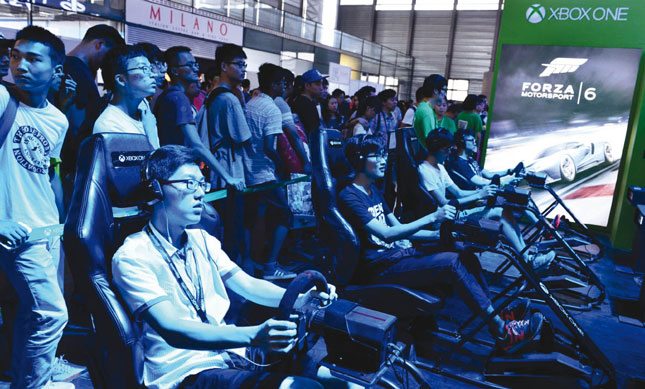
Sony and Microsoft are finally taking on the Chinese video game market.
Few forms of entertainment have the same near-universal appeal of video games. There’s just something about escaping into a virtual world to rack up points, defeat opponents and take control that’s latched onto a generation of young people and is refusing to let go.
Nowhere is this more the case than in China, where a healthy gaming culture centered around PC games, and more recently, mobile games, is thriving. Gaming market research firm Newzoo projects that the Chinese video game market will be worth $22.2 billion by the end of this year.
Despite a historic decision by China’s Ministry of Culture in January 2014 to lift its 14-year ban on video game consoles, foreign console companies Sony and Microsoft have largely failed to turn the attention of China’s 517 million gamers toward their products. In July 2015, video game market research firm Niko Partners estimated that fewer than 550,000 of Sony Playstation 4 and Microsoft Xbox One, combined, will be sold in China by the end of the year, a pittance compared to the profits made by both PC and mobile gaming. As a result, both companies are scrambling for new strategies to make headway in this potentially fruitful market.
Press Start
Global video game manufacturers have taken an interest in China since the early days of console gaming. The first console released in China was Nintendo Entertainment System (or Famicom) in the mid-eighties, though they were so expensive that it was much more common for families to purchase localized copies of the console, like 1987’s Subar Little Tyrant.
In 2000, the Ministry of Culture banned the sale of all foreign and domestic consoles on the mainland, for fear of corrupting Chinese youth with violent imagery and a general oversaturation of gaming. Video games rose to prominence in other forms, largely through PC gaming, which was accessible due to its affordability and the ubiquity of Chinese internet cafes.
A thriving gray market also developed during this 14-year period, in which Chinese consumers would purchase consoles meant for non-mainland markets or buy from neighbors like Taiwan and Macau.
Niko Partners estimates that illegal console sales in China were stable at around 1 million per year before the ban was lifted, with a peak of 1.7 million when PlayStation 3, Nintendo Wii and Xbox 360 were newly released. “There already is a big console hardware and software market in China,” says Newzoo CEO Peter Warman. “It is just not controlled by the original manufacturers and IP owners.” Newzoo’s 2014 Year in Review report estimates that some 100 million Chinese have played a console game at least once.
Level Up
In January of 2014, the Chinese government officially lifted the ban on the sale of foreign game consoles by allowing them to be sold through the Shanghai Free Trade Zone, and the Ministry of Culture announced this July that the policy will be rolled out nationwide. “It seemed as though it had to happen,” says Lisa Hanson, Managing Partner at Niko Partners, about the ban removal, “even if just in the name of the WTO (World Trade Organization) and fair trade.”
Microsoft pounced on the opportunity to be the first foreign company to sell their newest console, Xbox One, in China. They partnered with Chinese media company BesTV to comply with the Ministry of Culture’s regulations on foreign companies doing business on the mainland, and released the console in September 2014. Around 100,000 consoles, priced between RMB 3,699 ($602) and RMB 4,299 ($700), were sold at the launch.
Meanwhile, Sony began working toward the Chinese release of their own latest console, Playstation 4, in partnership with Shanghai Oriental Pearl Group. Despite the fact that Sony and Microsoft are rivals, their China partners were both subsidiaries of state-owned Shanghai Media Group (SMG). Any pretense of competition dissipated after it was announced in December that these two subsidiaries were to merge, with BesTV acquiring Shanghai Oriental Pearl Group—leading to suggestions that there could be conflicts of interest.
In any case, the Playstation 4 hit the market in March following delays—it had been slated for launch in January—and cost RMB 800 ($129) less than the cheapest Xbox One model.
In the Game
As was probably inevitable for the first foreign release of a console on the mainland in years, the Microsoft Xbox One release was plagued with problems. The console was prohibitively expensive (with a $100 price hike from the Xbox One’s US release a year earlier), and several promises made by Microsoft to their Chinese consumers, such as having streaming services from their partner BesTV embedded in the console, were not present.
Perhaps the biggest disappointment for consumers and the most significant problem for the companies going forward is the choice of games on the consoles. The Xbox had a lackluster range of 10 launch titles that lacked so-called AAA games, the industry term for critically acclaimed games with ultra-high development budgets, like Grand Theft Auto V, which is banned by the Ministry of Culture but has 10 million illegal downloads on popular Chinese bootleg site Ali213.
This fact was exacerbated by a region lock on the console, which meant that Chinese gamers were unable to play games bought outside the mainland. Although the PlayStation 4 later debuted without a region lock, and Microsoft issued an update to remove theirs, it is still inconvenient for gamers to purchase some sought-after games legally as users are unable to download foreign games.

According to Niko’s Hanson, if Sony and Microsoft stand any chance of competing with PC and mobile gaming, as well as making their legal consoles more appealing than gray market consoles, they need to focus on one thing: great games. “There will always be controls on content that is allowed in China,” she says. “The games are critical for success, so the market needs more AAA titles from either domestic or foreign developers. The gamers do not mind from whom, just that the great games become available.”
This may be in the cards, particularly if Sony and Microsoft work with Chinese developers to create more Chinese AAA games. At a SMG press conference, Chairman Li Ruigang mentioned game development as a high priority for the company. “When BesTV joined forces with Microsoft, we already announced that we would invest in game development,” he said. “We also discussed cooperation with various big game developers in China to bring more games to home consoles.”
The growth in domestic developers that Hanson mentions could be spurred by the arrival of a homegrown console, which seemed on the horizon anyway. “I think we will see domestic consoles in the market from Alibaba and others,” she says, “because there are already dozens of TV-based consoles (running Android or AliYun OS) in the market.”
But ultimately, it still comes back to the quality of games. “With no good games to play, I would not want to buy [a console],” says Guo Peijun, a visual designer and owner of an Xbox 360 and Playstation 3.
Another lingering issue is the popularity of mobile games over consoles in China. The market’s impressive 37.7% growth from 2013 to 2014, according to a December 2014 report by the China Audio-Video and Digital Publishing Association, was largely due to mobile games, whose revenue shot up 145% in the past year. According to Newzoo’s Warman, console games are expected to take between 2% and 3% of this year’s market.
Continue?
Despite their lack of headway thus far, the gaming market in China is too big and potentially lucrative for Sony and Microsoft to ignore. “We believe there is an opportunity to sell several million consoles for Microsoft and Sony, as long as they have a smart way to go about the situation,” says Warman. “There are enough Chinese consumers that have the budget and love to show off new devices.”
A statistic from the China Audio-Video and Digital Publishing Association report may bode surprisingly well for Sony and Microsoft. The number of gamers in China went up only 4.6% from 2013 to 2014, which means while the money spent on gaming skyrocketed, the number of people spending it did not. If the past year’s surge in revenue isn’t coming from new consumers, but rather longtime gaming fans who are spending even more money as they turn to new devices and games, then perhaps consoles do stand a chance—if they can tempt these established gamers to branch out even further.



















